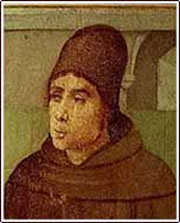John Scotus Erigena (c 800 - 880) |
 |
|---|
Irish Theologian and Philosopher
John Scotus Erigena (c 800 - 880) |
 |
|---|
Irish Theologian and Philosopher
John Scotus Erigena was a Scotch or Irish theologian, translator, scholar and commentator. He was perhaps the most learned man of his time and a remarkable thinker. Though in his day, he was an enigmatic figure who stood outside the mainstream, it is now widely accepted that Erigena possessed the finest and most original intellect of the early Middle Ages. He was highly proficient in Greek, quite rare at that time in mainland Europe.
His writings were frank, bold and free-thinking; filled with rationalistic opinions and speculations, and were completely devoid of the self-censorship and deference to orthodox theology that was predominant in his day. He emphasized knowing God through direct revelatory experience, rather than through the controlling dogmas of Church orthodoxy.
About 847 he was invited by Charles II, to take charge of the court school at Paris; and to translate the writings of Pseudo-Dionysius and his commentator Maximus the Confessor. His own philosophical speculation is contained in the De divisione naturae and the fragmentary De egressu et regressu animae ad Deum. He remained in France for at least 30 years. At the request of the Greek Emperor Michael (in c858) John undertook some translation into Latin of the works of Pseudo- Dionysius and added his own commentary. He was thus the first to introduce the ideas of NeoPlatonism from the Greek into the Western European intellectual tradition, where they were to have a deeply formative influence over Christian theology. He was convinced of the necessity for rational explanation of the universe and he tried to fuse reason with faith.
His Philosophy
Erigena’s principal work, De divisione naturæ (862–866), was an attempt to reconcile the Neoplatonist doctrine of emanation with the Christian tenet of creation.
It classified nature into 4 parts:
Erigena regarded man as a microcosm of the wider universe, because he has senses and reason to determine causes and mechanisms. He regarded man's nature to be part divine and part animal. Sin, he contended, was derived from the animal nature. It was simply misdirected will. The divine in man, however, was the means by which he would return--through grace--to God.
Erigena argued that God, as the First Cause of all things, surpasses all understanding. The creative power of God cannot be comprehended by the intellect. Divine Nature cannot be defined by any name, and transcends any category of being. However, divine appearances or "theophanies" may, through the grace of God, be apprehended by the intellect. These "theophanies" may provide the intellect with images of eternal causes, and may provide insight into the eternal reasons for the being of things.
According to Erigena, all of creation is a reflection of the universal reality of God. God created the world in such a way that every genus or species is interconnected; both participating in the reality of a genus or species higher than itself, as well as a genus or species lower than itself. Every aspect of created order receives its reality by participating in a higher genus or species of being.
Erigena felt that each species of being is good to the extent that it participates in the goodness of a higher species of being. Thus, goodness is ultimately determined by whether a species of being participates in the goodness of God. Evil is demonstrated to the extent that one fails to participate in the goodness of God. The order of the universe has been established by Divine Providence, which is the primordial cause of all life.
The process by which all things return to God may include stages in which various genera and species return to their primordial causes, and the primordial causes then return to God. All things, visible and invisible, material and spiritual, corporeal and incorporeal, must ultimately return to God to find the Cause of their being.
Although many would find streams of heretical thought in Erigena’s philosophies, and perhaps rightly so, there can be no doubt that he himself abhorred heresy, and all through his life considered himself a loyal and orthodox Christian. Some have felt his writings bordered on pantheism. For “orthodoxy,” his belief in the universal restoration of all creation back to the Creator is grave heresy. However, Erigena felt that the doctrines he discovered in the writings of the Greek fathers were both philosophically true and theologically acceptable. His intellectual temperament in theological speculation was towards freedom, rather than restraint. This freedom he reconciled with his respect for the teaching authority of the Church as he understood it.
In this sense, he displayed a freshness of vision and expression enjoyed by the very early Christian teachers and philisophers; a condition which prevailed before dogma had pushed its roots much deeper into the intellectual fabric of the Church.
Tradition has it that he finally returned to Britain towards the end of his life to become Abbot of Malmesbury in southern England. With his death, there came an end to the most part for serious, creative and original philosophical thought within Christendom, for at least seven centuries. Through the Council of Sens in 1225 and by Pope Gregory XIII in 1585, his works were condemned as heretical. In 1681 'De divisione naturae' was placed on the 'Index of Forbidden Books'.
Nevertheless, John's basic position determined the tone of Christian thought for centuries, being developed by all later thinkers, and being far more influential than was ever officially acknowledged. His assertion that one was able to access God through direct revelatory experience, foreshadows St Teresa, St John of the Cross and all later Christian mystics. His ideas also influenced a good deal of philosophic thought outside the church.
Back to Tracing Universalist Thought Index